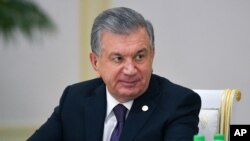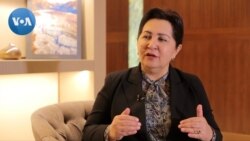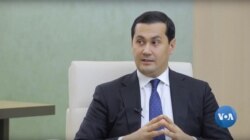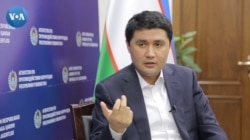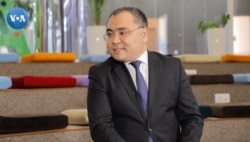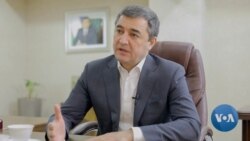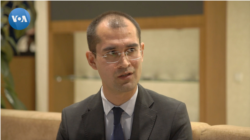When Uzbek President Shavkat Mirziyoyev visited Washington three years ago, he renewed a strategic partnership agreement and pledged to intensify a broad range of systemic reforms while opening his country to a multi-dimensional relationship with the United States.
Mirziyoyev’s first term in office is now winding down, with a presidential election set for October 24, and his success in fulfilling those and other promises is being assessed, both in Washington and at home.
For the U.S. State Department, the verdict is mixed.
Secretary of State Antony Blinken last month welcomed “Uzbekistan’s progress on its reform agenda, including when it comes to combatting trafficking in persons, protecting religious freedom and expanding space for civil society,” in a conversation with Uzbekistan Foreign Minister Abdulaziz Kamilov.
But he also called for the “protection of fundamental freedoms, including the need to have a free and competitive electoral process,” according to an official readout of the conversation last month.
The progress on Mirziyoyev’s reform agenda is also getting mixed reviews in Uzbekistan, where policymakers and ministers acknowledge in interviews with the Voice of America that intensifying citizen demands for accountability and responsibility have been difficult to meet.
“Reforms have so far been messy,” concedes Tanzila Narbaeva, the Senate chairperson. “We are finding out every day how our issues are much more complicated than we had imagined — and what it will take for us to overcome them. There will be roadblocks and barriers, none of us have any doubts about that. Still, we must not stop fixing the problems while making sure those fixes are systemic.”
Narbaeva, Uzbekistan’s highest-ranking woman, is a close ally of Mirziyoyev, who has sought to rebuild popular support by institutionalizing his reforms. She acknowledges that it’s difficult to convince a deeply skeptical public that the Uzbek legislature is more than just a rubber stamp.
“Parliament is fully independent,” she insists. “We are not getting orders from anyone anymore.”
Deputy Prime Minister Sardor Umurzakov, the minister of investments and foreign trade, believes the system must closely work with Uzbek youth, who constitute a majority of the population and who he says are increasingly demanding, impatient and critical.
"They are connected to the world ... unstoppable. We must engage them, create opportunities, improve conditions. Ideas must turn into projects, projects into companies creating jobs, producing and exporting goods, paying taxes, and offering people space to prosper and thrive, here in our own country."
Akmal Burhanov, head of the Anti-Corruption Agency created in 2020, says corruption is deeply entrenched in Uzbekistan and expanded during the pandemic, a problem that is acknowledged by Narbaeva, Umurzakov and other lawmakers and ministers.
“We are under enormous pressure from everyone,” Burhanov tells VOA. “The public wants us to fight corruption fast and effectively. They expect miracles. But just one agency can’t do it. We need everyone contributing.”
Burhanov’s agency is pushing an unprecedented law requiring financial disclosures by public servants. “It’s time for us to draw a line and make sure that the system does not allow conflicts of interest.”
The U.S. Justice Department and State Department Bureau of International Narcotics and Law Enforcement Affairs are assisting this anti-corruption watchdog, providing technical support.
Ibrokhim Abdurakhmonov, Uzbekistan’s innovation minister, a U.S.-educated scientist, has been working with international partners and hopes Washington will continue to support Tashkent’s development goals.
"We want to create a knowledge-based economy," says Abdurakhmonov. But just as with any strategic goal, the country faces a rocky road to achieving this. Uzbekistan generates growth – and revenue – mostly from natural resources and raw materials.
"We have 1,000 researchers per million people. ... Developed countries have three to four times more. Worse, this system isn’t used to rewarding creators and inventors. Scientific work and academic research have always been done merely to earn a salary," not to advance the frontiers of knowledge, Abdurakhmonov explains.
Energy Minister Alisher Sultanov insists that Uzbekistan has finally started reforming its gas and electricity infrastructure. He says an “outdated supply system cannot meet increasing demand,” while stressing the need for energy independence.
Sultanov tells VOA that he takes responsibility for shortages experienced last winter and agrees that the system he oversees is deeply corrupt, lacks accountability and fails to deliver effective and consistent service.
Avazbek Madaminov, the Justice Ministry official overseeing NGOs, also argues that his office does not take orders. Only the minister makes final decisions on NGO and political party registrations.
But domestic and international critics say the more than 9,000 NGOs in Uzbekistan do not constitute a true civil society and that the current “nongovernmental” system is merely an extension of the state.
Tashkent created much of what passed for civil society under its previous leader, Islam Karimov, as window dressing intended to fool the world into believing the country was democratizing.
Uzbek activists and their allies abroad complain that the ministry still registers only those groups that promise to function as its agents. Instead of regulating organizations, they say, the government interferes directly, pressuring those that demand better services, transparency, accountability and justice.
Tashkent gets countless recommendations every year from Western counterparts and partners, in particular, about how to assure a more robust and autonomous civil society.
Pressed, Madaminov says that Uzbekistan hears the West, understands its international obligations, and tries its best to align with global norms while building “its own kind” of civil society, born of the needs and interests of Uzbeks.
“The success of our civil society,” Madaminov says, “depends ultimately on the will and commitment of those who run these organizations. Our laws and the system we’re reforming offer opportunities to make a positive difference in the lives of the Uzbek people.”
Every major political figure VOA talks to sees American support and assistance as key to transforming Uzbekistan, acknowledging that Washington has high expectations.
Their message: Continue helping in any way possible. Have patience with Uzbekistan since it’s learning with every step. Just as America always wishes for it, they say, Uzbekistan, too, wants security, prosperity and ultimately freedom.




